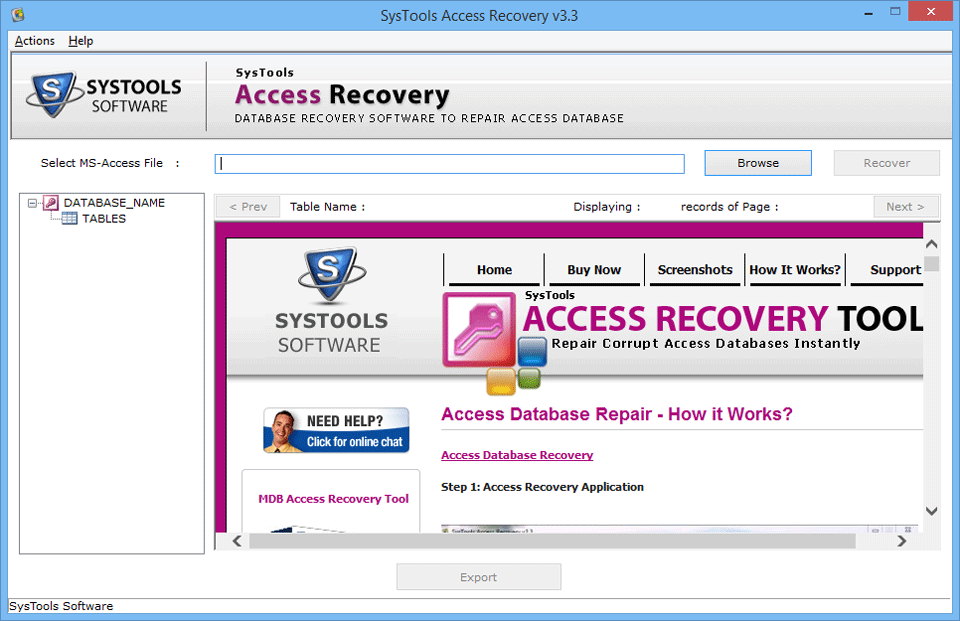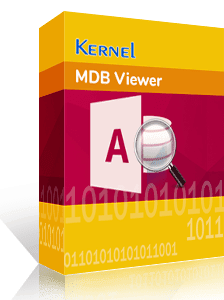
- #MDB ACCDB VIEWER ONLINE HOW TO#
- #MDB ACCDB VIEWER ONLINE INSTALL#
- #MDB ACCDB VIEWER ONLINE SOFTWARE#
- #MDB ACCDB VIEWER ONLINE PROFESSIONAL#
If you’re looking for the best MDB Viewer tool, I would recommend you two names: SysInfoTools and Data Recovery Solutions. But if you don’t want to repair Access database and just want to open it, you can simply use the MDB Viewer tool. In such a situation, you have to repair Access database either manually or by using a 3 rd party tool. And whenever you try to open it in Microsoft Access, you receive an error message. Let’s suppose one of your Access database files is corrupted. An Access database is prone to corruption due to various reasons.
#MDB ACCDB VIEWER ONLINE PROFESSIONAL#
The best part of a professional MDB Viewer tool is that it can open Access database even if it’s corrupted.
#MDB ACCDB VIEWER ONLINE SOFTWARE#
This means you can simply download the software for free, run its installation, and make use of it. There are many vendors in the online marketplace which provide MDB Viewer tool.

This software can open Access database files without actually requiring Microsoft Access. Do you? Instead, a smart user always looks for a better solution like MDB Viewer tool.
#MDB ACCDB VIEWER ONLINE INSTALL#
Nobody wants to install Microsoft Access on the system to open just one or two files.

How will you open it? It may seem impossible to open a file without having the respective application. Sometimes it may happen that you receive an Access database file but Microsoft Access ain’t installed on your system.
#MDB ACCDB VIEWER ONLINE HOW TO#
You cannot open the database in Access 2007 at all.Also Read: Top 5 MS Access Database Corruption Causes and Solutions How to Open Access Database? You cannot open the object that uses the feature. You cannot modify the object that uses the feature. Depending on the feature, one of the following might happen when you try to use the database in Access 2007: However, Access 2016, Access 2013, and Access 2010 include some features that require Access 2016, Access 2013, and Access 2010 to run. Use Access 2007 to open a database that was created or modified in newer versionsīecause Access 2016, Access 2013, Access 2010, and Access 2007 all use the same file format, you can use Access 2007 to open a database that was created in Access 2010, Access 2013, or Access 2016 without first using the Save As command. When you open an Access 97 database in either of these two products, the Database Enhancement wizard appears to help convert the database to an. You can also use Access 2007 or Access 2010 to convert an Access 97 database to the. Open the database and click File > Save As > Access Database (.accdb) > Save As > Save. Open the Access 97 database in Access 2003.Ĭlick Tools > Database Utilities > Convert Database > to Access 2002-2003 file format.Įnter a name for the database and click Save. For example, here’s how to use Access 2003 to open an Access 97 database, then convert it to a format that can be opened by Access 2013: However, you can open an Access 97 database in a previous version of Access, and then save the database in a format that Access 2013 can open. Starting with Access 2013, it’s no longer possible to directly convert an Access 97 database (.mdb) to the. Access automatically closes the original database.Ĭonvert an Access 97 database to the. In the Save As dialog box, type a file name in the File name box, and then click Save.Īccess creates the copy of the database, and then opens the copy.

If needed, Access will also prompt you to save any changes. Click Yes to make Access close the objects, or click No to cancel the entire process. If any database objects are open when you click Save As, Access prompts you to close them prior to creating the copy. accdb format.Ĭlick File, click Save As, and then click Save Database As.Ĭhoose the Access file type, and then click Save As. To continue, see the section Convert an Access 97 database to the. Note: If the Database Enhancement dialog box appears, the database is using a file format that is earlier than Access 2000.


 0 kommentar(er)
0 kommentar(er)
